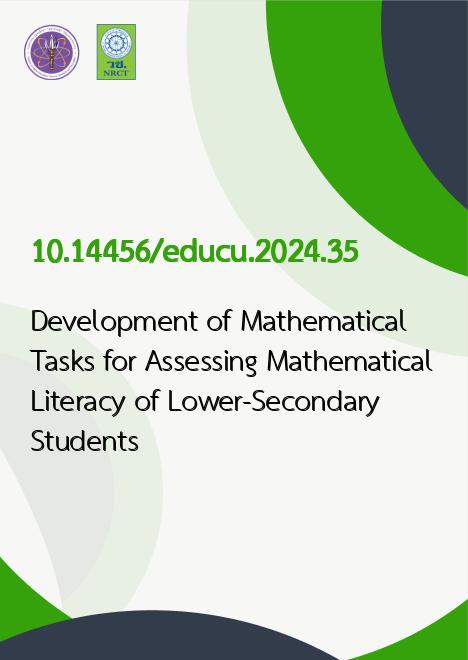
|
Development of Mathematical Tasks for Assessing Mathematical Literacy of Lower-Secondary Students |
|---|---|
| รหัสดีโอไอ | |
| Creator | Weerawat Thaikam |
| Title | Development of Mathematical Tasks for Assessing Mathematical Literacy of Lower-Secondary Students |
| Contributor | Sakon Tangkawsakul, Nuttapat Mookda |
| Publisher | Centre for Education Innovation, Print and Online Media |
| Publication Year | 2567 |
| Journal Title | Journal of Education Studies, Chulalongkorn University |
| Journal Vol. | 52 |
| Journal No. | 3 |
| Page no. | EDUCU5203005(14pages) |
| Keyword | mathematical task, mathematical literacy, lower-secondary student |
| URL Website | https://so02.tci-thaijo.org/index.php/EDUCU |
| Website title | Journal of Education Studies, Chulalongkorn University |
| ISSN | 2651-2017 (Online) |
| Abstract | Assessing students' mathematical literacy requires the use of mathematically specific tasks. This research aimed to: (1) develop principles for task design and a prototype task, and (2) examine the implementation of task in assessing the mathematical literacy of lower-secondary students. The study comprised three phases: preparation and design, task implementation, and retrospective analysis. Participants included mathematics educators, teachers, and students. Research tools encompassed tasks and semi-structured interviews. Data analysis used descriptive statistics (frequency and percentage) and content analysis. The research had two key findings regarding task design and implementation: 1) Task designing involves several crucial aspects, including 1.1) Tasks should be relevant to students' lives and spark their interest. 1.2) The questions within the task should flow logically and build upon one another. 1.3) Collaboration among educators and other stakeholders in designing tasks leads to more comprehensive assessments. And, 1.4) Scoring criteria should be clear, concise, and easy for educators to apply. 2) The task implementation revealed that while most students could formulate mathematically, some faced challenges in employing, interpreting, and evaluating their responses within the context of the questions. These findings provide insights for collaborative mathematical task creation for appropriately assess students' mathematical literacy in real contexts. |